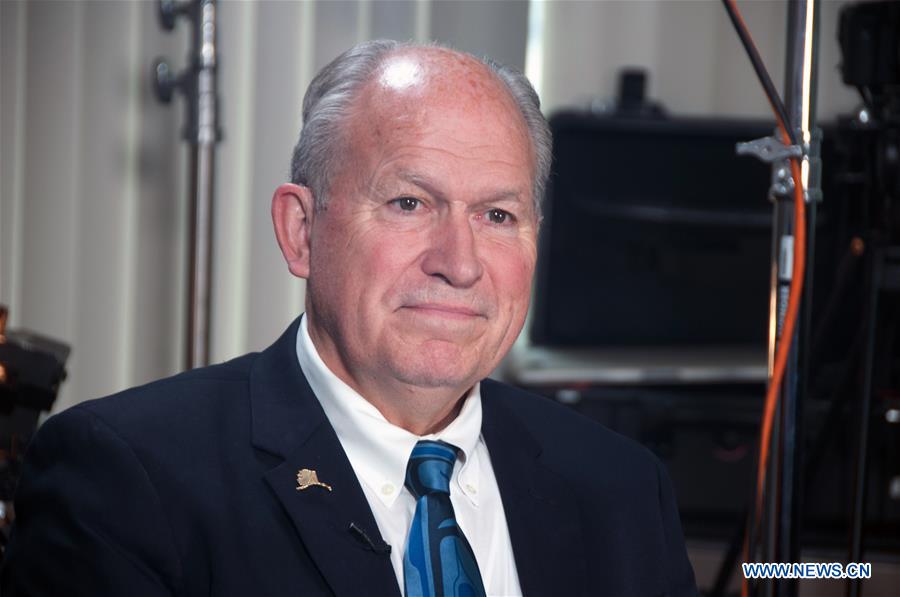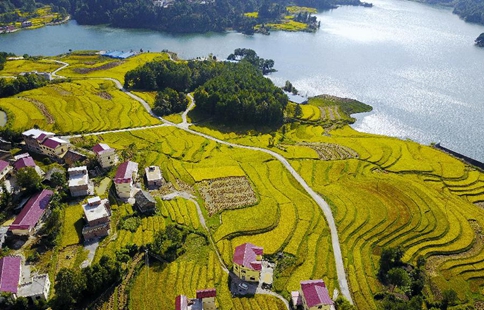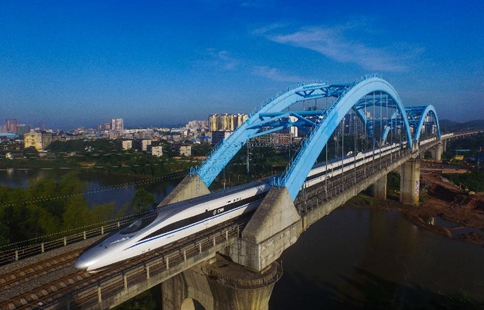
Bill Walker, Governor of U.S. state of Alaska, receives an interview with Xinhua in Anchorage, Alaska, theUnited States, on Sept. 12, 2017. Alaska faces "unparalleled" opportunities for cooperation with China, given its rich natural resources and close proximity to the Asian economic powerhouse, Bill Walker told Xinhua in a recent exclusive interview in Anchorage. (Xinhua/Yang Shilong)
ANCHORAGE, the United States, Sept. 23 (Xinhua) -- The governor of the largest U.S. state by area has shown a strong and broad interest in conducting mutually-beneficial cooperation with China, ranging from an ambitious gas pipeline to Arctic shipping, and even the promotion of winter sports.
Alaska faces "unparalleled" opportunities for cooperation with China, given its rich natural resources and close proximity to the Asian economic powerhouse, Governor Bill Walker told Xinhua in a recent exclusive interview in Anchorage.
The Last Frontier state "has had a long relationship with China" and looks forward to keeping and further developing it, said Walker, who is embarking on a trip to China on Sept. 25 along with the governor of the U.S. state of Missouri.
"It is an opportunity to return to China and to look at, again, the opportunities that Alaska and China have to share the benefits to both from the development opportunities or natural resources in Alaska," noted Walker, who traveled to China once several years back but is going as the governor for the first time.
EXPORTS, LNG PROJECT HIGH ON AGENDA
The upcoming trip, organized by the China General Chamber of Commerce-USA, will take the governor to the three Chinese metropolises of Beijing, Shanghai and Guangzhou, where he will attend a China-U.S. investment forum and talk to local business leaders and officials.
With his highly resources-dependent state experiencing financial difficulties due to the global oil prices slump, one of the top priorities on Walker's agenda is to export more to the Chinese market.
"We have way more natural resources than we have people. We know that we cannot develop these resources without the market opportunity," the governor told Xinhua.
With a population of merely 750,000, Alaska is one of the eight U.S. states that hold a trade surplus with China, which stood at some 700 million U.S. dollars in 2016 according to the U.S. Department of Commerce.
"China has been Alaska's largest export customer for many many years on fish, nearly 1 billion dollars a year," said Walker.
In addition to its traditional exports of seafood, crude oil, timber and minerals, Alaska is now hoping to sell more of its liquefied natural gas (LNG) to China, which may turn out to be a critical factor in the success of a major energy export project strongly backed by the Walker administration.
The over-40-billion-dollar Alaska LNG Project, which consists of an 800-mile (about 1,300 km) pipeline and gas treatment and liquefaction plants, aims to commercialize the state's stranded North Slope gas reserves for overseas markets, particularly in the Asia-Pacific region. Once completed, it is expected to be able to process and export 20 million metric tons of LNG each year, providing revenue to the state for generations.
"So we look at the 1.4 billion people in China and their need for the clean burning natural gas that we have," noted Walker, adding that China, now the world's second largest economy and biggest energy consumer, is moving fast from coal toward cleaner fuels.
While the current U.S. administration under President Donald Trump is denying climate change by announcing its withdrawal from the historic Paris Agreement, Alaska, which has felt the increasing impact of global warming, is ready to set an example for addressing the challenge through cooperation with potential LNG buyers like China.
Through helping any recipient of the Alaskan LNG to greatly reduce emissions, the project is a wonderful way of "approaching the climate change from a commercial standpoint" while also "creating jobs and opportunities," stressed the governor.
EXPANDING "BELT AND ROAD" TO ARCTIC
Interestingly, the governor has also found certain merits of climate change and linked them to the China-proposed Belt and Road Initiative, in which Alaska may also have a role to play.
Walker said that after attending a Belt and Road forum in Seoul, the Republic of Korea about a year ago, he realized that the "opening of the Arctic" could be a "big part" of this great initiative's mission and goals.
According to the governor, in the past few years, climate change is allowing commercial traffic to pass through the once-impassable Northwest Passage, the sea route to the Pacific Ocean through the Arctic Ocean.
"Now we are having ships going to the Arctic because the ice has been diminished significantly over the years. So they (experts) are anticipating as many as 2,000 ships per year going across the top," he elaborated.
With a clear Northwest Passage, ship routes from Europe to eastern Asia would be several thousand kilometers shorter than the current route through the Panama Canal.
"It really is an opportunity to change the concept of transportation from Asia into Europe," added the governor.
PUSH FOR DIRECT FLIGHTS
With more and more Chinese going abroad for leisure and sightseeing purposes in recent years, Alaska is also witnessing a steady surge in incoming Chinese tourists, which has triggered calls for the introduction of direct flights between Alaska and the Chinese mainland.
Lamenting that he himself would still have to fly at least 20 hours on the next trip to Beijing due to the absence of nonstop flights, the governor told Xinhua, "We wish there were direct flights. And we are pushing very hard in every way we can to make that happen."
A direct flight between Anchorage, Alaska's largest city, and Beijing will only take about six hours, nearly half of the current flight time from Beijing to any major city on the U.S. east or west coast.
Walker called the proximity of his state to China "a very, very significant advantage" in future cooperation. And thanks to this special advantage, Alaska is already a major air cargo transit center in today's world, with an estimated 90 percent of cargo between North America and Asia passing through the Ted Stevens International Airport in Anchorage.
"So it's one of our goals, to bring direct (passenger) flights (from China) to Alaska," he added, "We have been working on it and will continue to work on it."
The governor also noted that apart from the tourists, his state also welcomes Chinese athletes of winter sports to come for training and practices.
After successfully hosting the Beijing Summer Olympics in 2008, China also won a bid in 2015 to host the 2022 Winter Olympics in Beijing.
The Chinese Olympic Ski Team has showed interest in coming to Alaska to train for the 2022 Olympics. "We have a lot of snow in Alaska for a good part of the year, so we are following up on that opportunity as well," said Walker.
TRANSCEND PARTISAN POLITICS
It has been a fad in recent years for U.S. governors to visit China and explore opportunities for cooperation. California Governor Jerry Brown and Illinois Governor Bruce Rauner went to China earlier this year, while New York Governor Andrew Cuomo is also said to be seriously considering a China trip.
Conceding that political factors often get in the way of bilateral trade and cooperation, the governor took pride in his own status of having no party affiliation.
"You know, I'm the only non-partisan governor in our nation. I made every decision based on what was good for Alaska," he told Xinhua.
"I don't check with a party, so it gives me the opportunity to be not really engaged on some of the partisan issues that sometimes rise up," said Walker.
He expressed the hope that there would be a good continuation of "positive discussions and dialogue" between the two countries' top leaders, and all parties concerned could do things that are "beneficial to both the United States, (including) Alaska, and China."















